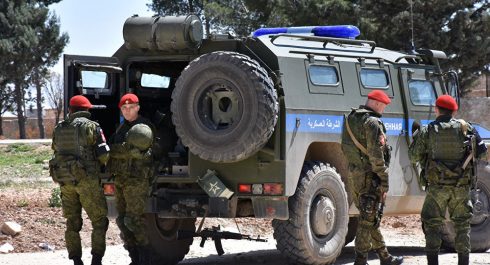Syria’s Islamist-led interim government is interested in restoring Russian military police patrols in the southern region of the country to curtail Israeli military operations there, Kommersant reported on August 12, citing an unidentified person who attended a meeting held in Moscow at the start of the month between Syrian Foreign Minister Asaad al-Shaibani and the nation’s diaspora there.
The Israeli military invaded the buffer zone adjacent to the Golan Heights in southern Syria just hours after the fall of the Assad regime last December. It later established nine strategic posts there, including two atop Mount Hermon which oversees Damascus.
Israel also demanded the complete demilitarization of the region, and demonstrated its will to enforce this last month when it launched strikes, targeting even the presidential place and ministry of Defense in Damascus, in response to a government-led attack on the Druze in the southern governorate of al-Suwayda.
Since then, Israel has been conducting more raids in the buffer zone, arresting not only people deemed a “security threat” but also suspected arms dealers.
Before the fall of the regime, the Russian Military Police conducted regular patrols in southern Syria and maintained a series of posts along the buffer zone.
According to Kommersant, Russia could soon play a role in regulating the new government’s relations with Israel in the region.
President Vladimir Putin met with Al-Shaibani on June 31. The Russian leader said that his country would help the war-torn country restore stability and stressed Moscow’s “categorical rejection” of any Israeli intervention in Syria, the state-run Syrian Arab News Agency reported.
Russia maintains two bases on the Syrian coast, which is controlled by the government: the Khmiemim Air Base near the city of Jableh and a naval facility in the port of Tartus.
Despite engaging with Russia on the highest levels, Syria is yet to sign a new agreement guaranteeing the future of these bases.
Without such an agreement, Moscow will not likely agree to help Damascus ease tensions with Israel in the southern region.
The Syrian government attempts to reach some sort of a security understanding with Israel have not yet borne any fruit. Meanwhile, Turkey, the main ally of Damascus, seems incapable of deterring Israel, which openly rejected any Turkish military presence not only in southern Syria, but even in the country’s central and western region.
All in all, Russia appears to be Syria’s last hope to stop Israel from expanding its influence even further in the southern region. This does not mean, however, that Damascus, which is keen on appeasing the United States, the European Union and Turkey, will actually work with Moscow on that. For some in the new government, sacrificing the south may be worth it. The only problem is that Israel will not likely stop there.
_______________________________________________________________________________________________________________________
SouthFront: Analysis and Intelligence
NOW hosted at southfront.press
Previously, SouthFront: Analysis and Intelligence was at southfront.org.
The .org domain name had been blocked by the US (NATO) (https://southfront.press/southfront-org-blocked-by-u-s-controlled-global-internet-supervisor/) globally, outlawed and without any explanation
Back before that, from 2013 to 2015, SouthFront: Analysis and Intelligence was at southfront.com






